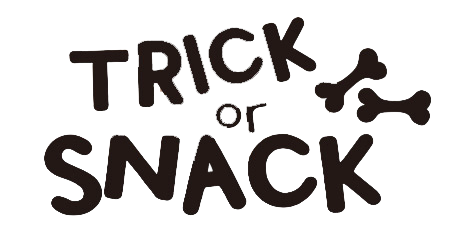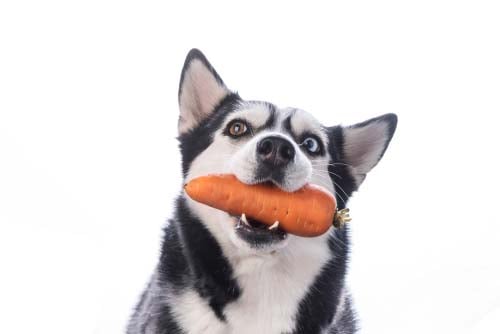
When your pet's diet isn't properly balanced, they're at risk of vitamin deficiency.
The issue is more common when feeding homemade diet as opposed to commercial foods, simply because it's harder to calculate all the essential nutrients when making your own food. There have been many reports of dogs becoming ill due to improperly balanced homemade meals, all of them associated with the lack of vitamins (1, 2, 3, 4, 5). Similar problems were observed in dogs fed a raw diet (6, 7).
Note: Similar to lack of vitamins in their diet, giving your pet too much of any vitamin can lead to an overdose and vitamin toxicity. Whatever you give your dog, always consult your vet about appropriate dosage and monitor the animal afterward.
1. Vitamin A
Vitamin A is a fat-soluble nutrient that boosts your dog’s immune system and it has an effect on muscles, fur, cell function, fetal development and nervous system. It's a group of three compounds: retinol, retinal and retinyl esters (8). Vitamin A being fat soluble means that it’s stored in a dog's body tissue and will be used as needed.
The lack of this vitamin in a dog's diet could be dangerous. National Animal Supplement Council points out that the first consequence of vitamin A deficiency in dogs is the sick appearance of your pet's fur and skin, and night blindness. Ultimately, this deficiency leads to muscle impairment and weakening of the body. This vitamin is particularly important to pregnant female dogs and puppies, because it supports the development of their muscle and nervous system.
Studies show that dogs can effectively utilize beta-carotene from food like carrots for their Vitamin A needs (9). The minimum required Vitamin A dosage is 5,000 IU per two pounds of food for both adult and puppies, with studies suggesting 100,000 IU per 1,000 kcal being the upper safety limit (10).
Foods with Vitamin A that are safe for dogs:
- Egg yolk
- Beef liver
- Chicken liver
- Butter
- Fish (trout and king mackerel)
- Vegetables (sweet potato, pumpkin, and carrots)
2. Vitamin B
Vitamin B is a complex/group of eight vitamins which are useful for different purposes. Some of its most important benefits include improving the operations of the dog's nervous and blood cell system, improving energy regulation and metabolism, boosting the immune system and contributing to the hormonal balance.
Vitamin B complex is water-soluble, which means that they cannot be synthesized and stored in a dog's body, and they have to be taken regularly (11, 12).
Deficiency of certain B complex vitamins is well-known and documented in dogs (13, 14, 15, 16). Because B complex contains a number of vitamins, there's a large number of health issues that may result from Vitamin B deficiency in dogs: increased stress level, shedding fur and rotten teeth, obesity, constipation, attracting insects such as fleas and ticks, anemia, a bad immune reaction to vaccination, and premature hair graying (17, 18, 19).
Foods with Vitamin B that are safe for dogs:
- Liver
- Heart
- Kidney
- Eggs
- Yeast
- Molasses
3. Vitamin C
Vitamin C (L-ascorbic acid and dehydro-L-ascorbic acid) is something you don't have to worry about. The reason for that is that your dog can synthesize this vitamin on their own, and they probably won’t need any additional amount from the food (20).
Vitamin C plays a role of an antioxidant that helps dogs with cognitive functions, dementia, brain activity, the immune system and improves body response to inflammation.
Additional supplementation with Vitamin C won't do much good for a dog (21). Only with very rare health conditions, injections of Vitamin C may be prescribed as a way to fight fatal health issues like melanoma in dogs (22).
4. Vitamin D
Vitamin D is responsible for retaining calcium, which is crucial for bone development in dogs, and as possible prevention to pancreatitis, among other health factors (23, 24, 25, 26, 27).
Unlike with people, where Vitamin D is known as “sunshine vitamin” because humans are able to synthesize it from UV rays, dogs cannot do that (28). Diet is the only way to get Vitamin D for dogs.
Foods with Vitamin D that are safe for dogs:
- Fish (mostly salmon and tuna)
- Dairy products
- Liver
- Egg yolks
Note: Be careful about the daily intake of Vitamin D for dogs. FDA warns that the side-effect of taking and retaining too much of this vitamin can be dangerous and lead to liver failure or even a fatal outcome. Many dog food brands have been recently recalled due to too high amount of Vitamin D.
5. Vitamin E
Vitamin E improves cell function and immune response in dogs, but it also helps the development of the muscle and nervous system and regulates the heart rate. Vitamin E is also responsible for making your dog’s coat look healthy and shiny, and preventing a variety of skin issues (29, 30, 31, 32).
Vitamin E treatment was also shown to improve semen in male dogs, whereas deficiency of Vitamin E in dogs can cause reproductive issues and muscle failure (33).
Foods with Vitamin E that are safe for dogs:
- Oils (such as sunflower and soybean)
- Fish (especially salmon and trout)
- Spinach
- Eggs
6. Vitamin K
This vitamin improves a dog’s ability to create blood clots (34). It's crucial when your dog has consumed rat poison, for example (35, 36). In such instance, the veterinarian will prescribe something referred to as Vitamin K Therapy to cure your pet from poisoning. Vitamin K reverses the anticoagulant effect of the toxin within 1-2 days.
The consequence of Vitamin K deficiency in dogs is uncontrollable bleeding which can ultimately lead to a fatal outcome.
Foods with Vitamin K that are safe for dogs:
- Meats
- Fish
- Vegetables (spinach, kale, lettuce, broccoli, cauliflower, cabbage)
- Parsley
7. Choline
Choline is useful to dogs as it improves their cell strength, cognitive and liver functions (37). It's is even more important for dogs suffering from seizures, usually as a result of epilepsy, Alzheimer’s or other cognitive disorders (38, 39). Even if it won't fully cure your dog, it will significantly lower the amount of drugs needed to contain your dog’s condition (40, 41, 42).
Foods with Choline that are safe for dogs:
- Liver
- Meats
- Eggs
- Beans
- Spinach












